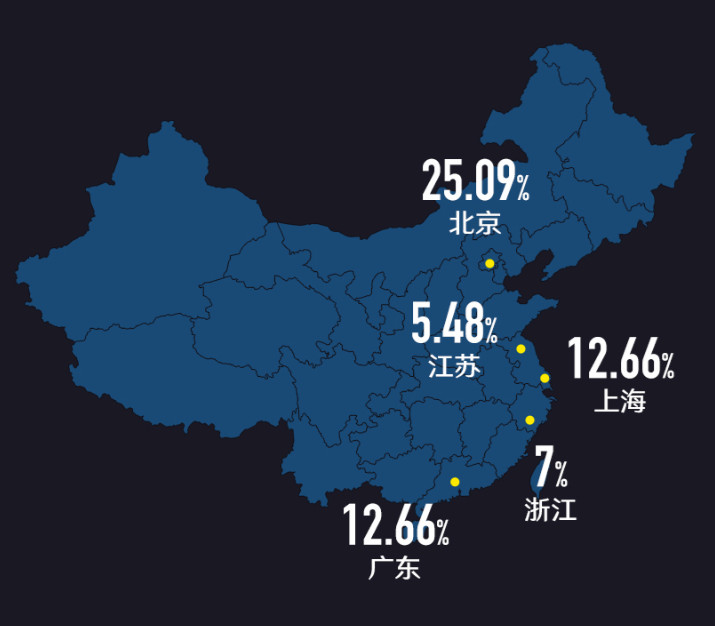China’s sizable middle class is on fire. A McKinsey & Company report projected that they would account for 76% of the country’s urban population by 2022. With thickening wallets and an urgent need to diversify investment options, more Chinese investors are turning their sights overseas, especially the US stock market.
In addition to its reputation as a more stable market, the attraction of US stock market was intensified by the remarkable performances of US-listed Chinese stocks. The wave, in turn, gave rise to another US IPO spree of Chinese tech firms this fall. Chinese online loan provider Qudian started trading as the fourth-largest US IPO this year. Several domestic peers join the trend by submitting IPO applications, including search engine Sogou, P2P lending platforms of PPDAI Group and Hexindai.
Given the trends, online brokerage service Tiger Brokers released a report to shed lights on preferences and demographics of Chinese-speaking traders who eyes US stock market.
Tech stocks are new favorites of Chinese investors
When we say Chinese people are becoming increasingly tech-savvy, we don’t only refer to the fact they are the first adopters of cutting-edge technology software and voracious buyers of smart gadgets. We also have a knack and understanding for technologies to seek better investment returns. The report shows that tech stock is the most popular category for Chinese-speaking investors.
The list for Top-10 US stocks among Chinese investors was star-studded by big tech names. A dominating 56% interviewees said they have invested in Alibaba, which had a growth of nearly 80 percent since the start of this year. JD and Apple performed equally well to rank the second and third. They are followed by Tesla, Google, Facebook, Baidu, Amazon Nvidia and Weibo.

Top 10 US-listed stocks for Chinese investors (Image credit: Tiger Brokers)
Younger-generation traders become mainstream
As digital natives, the country’s younger generations are first-movers to the sector. The report points out that post-80s gen represents nearly half (47.2%) of the users with post-90s gen comes as a close second (36.2%).

Image credit: Tiger Brokers
Regional distribution of the group tends to be concentrated in first-tier cities of Beijing, Shanghai and economically developed provinces of Guangdong, Zhejiang and Jiangsu. Shandong, Hubei, Fujian, Sichuan and Henan provinces also make up the list.

Regional distribution of Chinese overseas traders (image credit: Tiger Brokers)
Why, what, how of Chinese overseas investors
Why: Compared with domestic under-performing equity market, the decade-long bullish trend of US stock market is the most important reason that drives this shift. In addition, the willingness to invest in household US titles such as Apple, Nike and Starbucks fuels the trend. Other reasons detailed in the report are as follows:
- Bullish tends in US stock market (31.22%)
- Star companies in US equity market (29.70%)
- It’s difficult to get favorable returns through other channels (11.69%)
- Engaged in industries related to financing or US stock trading (8.56%)
- Working for, or related to companies that are planning for an US IPO (7.69%)
- Having overseas study or working experience (2.85%)
- Others (8.29%)
What: Over 65% of Chinese traders prefer Chinese companies when investing in the US. This is fair enough since the services of these companies have penetrated nearly every aspect of their lives. Besides language, their insights on a particular Chinese company or the industry might be deeper than that of a Wall Street expert who only does distant research.
Interestingly, Chinese investors prefer longer-term investments over shorter ones. Over 55% of Chinese investors will hold a position for over three months, and 20.03% for longer than a year.
How: US equity trading is still a niche market in China. Safety, knowledge, news timelines and language are the major concerns of Chinese investors when investing abroad. The report shows that commission rate, Chinese language support, and trading speed are the most valued factors when finding a broker.